Jiaxi Yang
additional authors not shown
Scaling Agentic Verifier for Competitive Coding
Feb 04, 2026Abstract:Large language models (LLMs) have demonstrated strong coding capabilities but still struggle to solve competitive programming problems correctly in a single attempt. Execution-based re-ranking offers a promising test-time scaling strategy, yet existing methods are constrained by either difficult test case generation or inefficient random input sampling. To address this limitation, we propose Agentic Verifier, an execution-based agent that actively reasons about program behaviors and searches for highly discriminative test inputs that expose behavioral discrepancies among candidate solutions. Through multi-turn interaction with code execution environments, the verifier iteratively refines the candidate input generator and produces targeted counterexamples rather than blindly sampling inputs. We train the verifier to acquire this discriminative input generation capability via a scalable pipeline combining large-scale data synthesis, rejection fine-tuning, and agentic reinforcement learning. Extensive experiments across five competitive programming benchmarks demonstrate consistent improvements over strong execution-based baselines, achieving up to +10-15% absolute gains in Best@K accuracy. Further analysis reveals clear test-time scaling behavior and highlights the verifier's broader potential beyond reranking.
SWE-Universe: Scale Real-World Verifiable Environments to Millions
Feb 02, 2026Abstract:We propose SWE-Universe, a scalable and efficient framework for automatically constructing real-world software engineering (SWE) verifiable environments from GitHub pull requests (PRs). To overcome the prevalent challenges of automatic building, such as low production yield, weak verifiers, and prohibitive cost, our framework utilizes a building agent powered by an efficient custom-trained model. This agent employs iterative self-verification and in-loop hacking detection to ensure the reliable generation of high-fidelity, verifiable tasks. Using this method, we scale the number of real-world multilingual SWE environments to a million scale (807,693). We demonstrate the profound value of our environments through large-scale agentic mid-training and reinforcement learning. Finally, we applied this technique to Qwen3-Max-Thinking and achieved a score of 75.3% on SWE-Bench Verified. Our work provides both a critical resource and a robust methodology to advance the next generation of coding agents.
Steering to Say No: Configurable Refusal via Activation Steering in Vision Language Models
Jan 31, 2026Abstract:With the rapid advancement of Vision Language Models (VLMs), refusal mechanisms have become a critical component for ensuring responsible and safe model behavior. However, existing refusal strategies are largely \textit{one-size-fits-all} and fail to adapt to diverse user needs and contextual constraints, leading to either under-refusal or over-refusal. In this work, we firstly explore the challenges mentioned above and develop \textbf{C}onfigurable \textbf{R}efusal in \textbf{VLM}s (\textbf{CR-VLM}), a robust and efficient approach for {\em configurable} refusal based on activation steering. CR-VLM consists of three integrated components: (1) extracting a configurable refusal vector via a teacher-forced mechanism to amplify the refusal signal; (2) introducing a gating mechanism that mitigates over-refusal by preserving acceptance for in-scope queries; and (3) designing a counterfactual vision enhancement module that aligns visual representations with refusal requirements. Comprehensive experiments across multiple datasets and various VLMs demonstrate that CR-VLM achieves effective, efficient, and robust configurable refusals, offering a scalable path toward user-adaptive safety alignment in VLMs.
Evaluating and Achieving Controllable Code Completion in Code LLM
Jan 22, 2026Abstract:Code completion has become a central task, gaining significant attention with the rise of large language model (LLM)-based tools in software engineering. Although recent advances have greatly improved LLMs' code completion abilities, evaluation methods have not advanced equally. Most current benchmarks focus solely on functional correctness of code completions based on given context, overlooking models' ability to follow user instructions during completion-a common scenario in LLM-assisted programming. To address this limitation, we present the first instruction-guided code completion benchmark, Controllable Code Completion Benchmark (C3-Bench), comprising 2,195 carefully designed completion tasks. Through comprehensive evaluation of over 40 mainstream LLMs across C3-Bench and conventional benchmarks, we reveal substantial gaps in instruction-following capabilities between open-source and advanced proprietary models during code completion tasks. Moreover, we develop a straightforward data synthesis pipeline that leverages Qwen2.5-Coder to generate high-quality instruction-completion pairs for supervised fine-tuning (SFT). The resulting model, Qwen2.5-Coder-C3, achieves state-of-the-art performance on C3-Bench. Our findings provide valuable insights for enhancing LLMs' code completion and instruction-following capabilities, establishing new directions for future research in code LLMs. To facilitate reproducibility and foster further research in code LLMs, we open-source all code, datasets, and models.
From Completion to Editing: Unlocking Context-Aware Code Infilling via Search-and-Replace Instruction Tuning
Jan 19, 2026Abstract:The dominant Fill-in-the-Middle (FIM) paradigm for code completion is constrained by its rigid inability to correct contextual errors and reliance on unaligned, insecure Base models. While Chat LLMs offer safety and Agentic workflows provide flexibility, they suffer from performance degradation and prohibitive latency, respectively. To resolve this dilemma, we propose Search-and-Replace Infilling (SRI), a framework that internalizes the agentic verification-and-editing mechanism into a unified, single-pass inference process. By structurally grounding edits via an explicit search phase, SRI harmonizes completion tasks with the instruction-following priors of Chat LLMs, extending the paradigm from static infilling to dynamic context-aware editing. We synthesize a high-quality dataset, SRI-200K, and fine-tune the SRI-Coder series. Extensive evaluations demonstrate that with minimal data (20k samples), SRI-Coder enables Chat models to surpass the completion performance of their Base counterparts. Crucially, unlike FIM-style tuning, SRI preserves general coding competencies and maintains inference latency comparable to standard FIM. We empower the entire Qwen3-Coder series with SRI, encouraging the developer community to leverage this framework for advanced auto-completion and assisted development.
SWE-RM: Execution-free Feedback For Software Engineering Agents
Dec 26, 2025


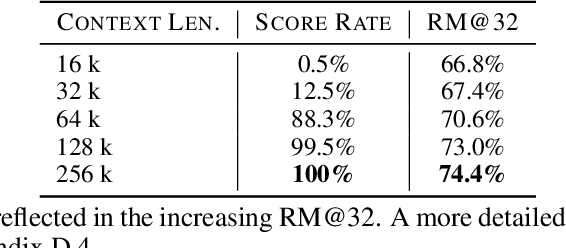
Abstract:Execution-based feedback like unit testing is widely used in the development of coding agents through test-time scaling (TTS) and reinforcement learning (RL). This paradigm requires scalable and reliable collection of unit test cases to provide accurate feedback, and the resulting feedback is often sparse and cannot effectively distinguish between trajectories that are both successful or both unsuccessful. In contrast, execution-free feedback from reward models can provide more fine-grained signals without depending on unit test cases. Despite this potential, execution-free feedback for realistic software engineering (SWE) agents remains underexplored. Aiming to develop versatile reward models that are effective across TTS and RL, however, we observe that two verifiers with nearly identical TTS performance can nevertheless yield very different results in RL. Intuitively, TTS primarily reflects the model's ability to select the best trajectory, but this ability does not necessarily generalize to RL. To address this limitation, we identify two additional aspects that are crucial for RL training: classification accuracy and calibration. We then conduct comprehensive controlled experiments to investigate how to train a robust reward model that performs well across these metrics. In particular, we analyze the impact of various factors such as training data scale, policy mixtures, and data source composition. Guided by these investigations, we introduce SWE-RM, an accurate and robust reward model adopting a mixture-of-experts architecture with 30B total parameters and 3B activated during inference. SWE-RM substantially improves SWE agents on both TTS and RL performance. For example, it increases the accuracy of Qwen3-Coder-Flash from 51.6% to 62.0%, and Qwen3-Coder-Max from 67.0% to 74.6% on SWE-Bench Verified using TTS, achieving new state-of-the-art performance among open-source models.
SWE-Flow: Synthesizing Software Engineering Data in a Test-Driven Manner
Jun 11, 2025Abstract:We introduce **SWE-Flow**, a novel data synthesis framework grounded in Test-Driven Development (TDD). Unlike existing software engineering data that rely on human-submitted issues, **SWE-Flow** automatically infers incremental development steps directly from unit tests, which inherently encapsulate high-level requirements. The core of **SWE-Flow** is the construction of a Runtime Dependency Graph (RDG), which precisely captures function interactions, enabling the generation of a structured, step-by-step *development schedule*. At each step, **SWE-Flow** produces a partial codebase, the corresponding unit tests, and the necessary code modifications, resulting in fully verifiable TDD tasks. With this approach, we generated 16,061 training instances and 2,020 test instances from real-world GitHub projects, creating the **SWE-Flow-Eval** benchmark. Our experiments show that fine-tuning open model on this dataset significantly improves performance in TDD-based coding. To facilitate further research, we release all code, datasets, models, and Docker images at [Github](https://github.com/Hambaobao/SWE-Flow).
Topological Structure Learning Should Be A Research Priority for LLM-Based Multi-Agent Systems
May 29, 2025Abstract:Large Language Model-based Multi-Agent Systems (MASs) have emerged as a powerful paradigm for tackling complex tasks through collaborative intelligence. Nevertheless, the question of how agents should be structurally organized for optimal cooperation remains largely unexplored. In this position paper, we aim to gently redirect the focus of the MAS research community toward this critical dimension: develop topology-aware MASs for specific tasks. Specifically, the system consists of three core components - agents, communication links, and communication patterns - that collectively shape its coordination performance and efficiency. To this end, we introduce a systematic, three-stage framework: agent selection, structure profiling, and topology synthesis. Each stage would trigger new research opportunities in areas such as language models, reinforcement learning, graph learning, and generative modeling; together, they could unleash the full potential of MASs in complicated real-world applications. Then, we discuss the potential challenges and opportunities in the evaluation of multiple systems. We hope our perspective and framework can offer critical new insights in the era of agentic AI.
Unlearning for Federated Online Learning to Rank: A Reproducibility Study
May 19, 2025Abstract:This paper reports on findings from a comparative study on the effectiveness and efficiency of federated unlearning strategies within Federated Online Learning to Rank (FOLTR), with specific attention to systematically analysing the unlearning capabilities of methods in a verifiable manner. Federated approaches to ranking of search results have recently garnered attention to address users privacy concerns. In FOLTR, privacy is safeguarded by collaboratively training ranking models across decentralized data sources, preserving individual user data while optimizing search results based on implicit feedback, such as clicks. Recent legislation introduced across numerous countries is establishing the so called "the right to be forgotten", according to which services based on machine learning models like those in FOLTR should provide capabilities that allow users to remove their own data from those used to train models. This has sparked the development of unlearning methods, along with evaluation practices to measure whether unlearning of a user data successfully occurred. Current evaluation practices are however often controversial, necessitating the use of multiple metrics for a more comprehensive assessment -- but previous proposals of unlearning methods only used single evaluation metrics. This paper addresses this limitation: our study rigorously assesses the effectiveness of unlearning strategies in managing both under-unlearning and over-unlearning scenarios using adapted, and newly proposed evaluation metrics. Thanks to our detailed analysis, we uncover the strengths and limitations of five unlearning strategies, offering valuable insights into optimizing federated unlearning to balance data privacy and system performance within FOLTR. We publicly release our code and complete results at https://github.com/Iris1026/Unlearning-for-FOLTR.git.
Tianyi: A Traditional Chinese Medicine all-rounder language model and its Real-World Clinical Practice
May 19, 2025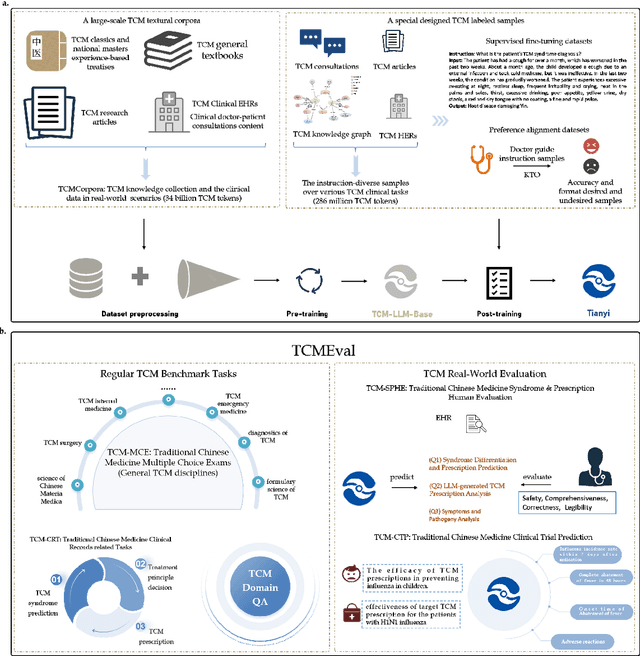
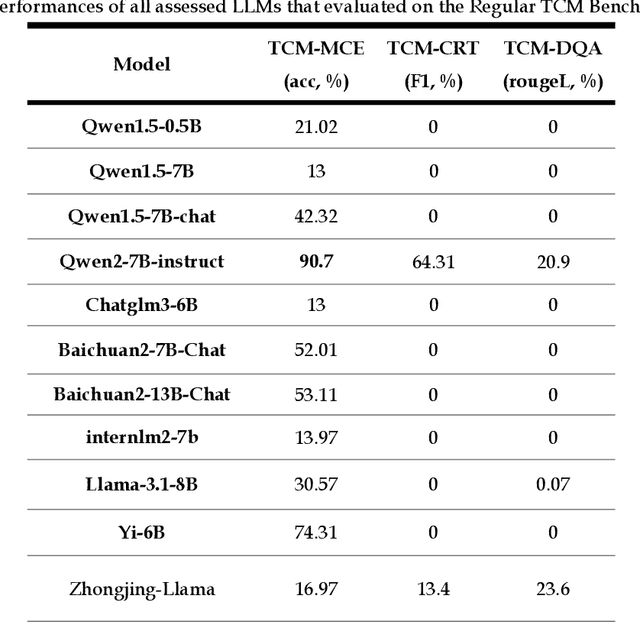
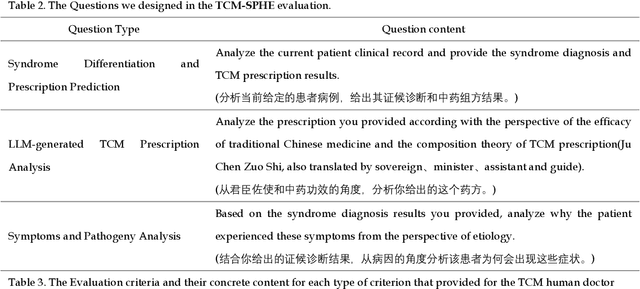
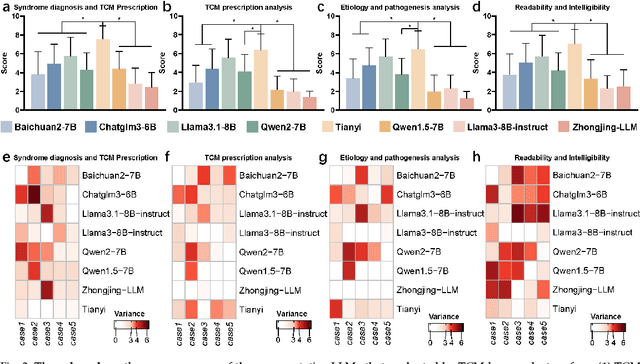
Abstract:Natural medicines, particularly Traditional Chinese Medicine (TCM), are gaining global recognition for their therapeutic potential in addressing human symptoms and diseases. TCM, with its systematic theories and extensive practical experience, provides abundant resources for healthcare. However, the effective application of TCM requires precise syndrome diagnosis, determination of treatment principles, and prescription formulation, which demand decades of clinical expertise. Despite advancements in TCM-based decision systems, machine learning, and deep learning research, limitations in data and single-objective constraints hinder their practical application. In recent years, large language models (LLMs) have demonstrated potential in complex tasks, but lack specialization in TCM and face significant challenges, such as too big model scale to deploy and issues with hallucination. To address these challenges, we introduce Tianyi with 7.6-billion-parameter LLM, a model scale proper and specifically designed for TCM, pre-trained and fine-tuned on diverse TCM corpora, including classical texts, expert treatises, clinical records, and knowledge graphs. Tianyi is designed to assimilate interconnected and systematic TCM knowledge through a progressive learning manner. Additionally, we establish TCMEval, a comprehensive evaluation benchmark, to assess LLMs in TCM examinations, clinical tasks, domain-specific question-answering, and real-world trials. The extensive evaluations demonstrate the significant potential of Tianyi as an AI assistant in TCM clinical practice and research, bridging the gap between TCM knowledge and practical application.
 Add to Chrome
Add to Chrome Add to Firefox
Add to Firefox Add to Edge
Add to Edge